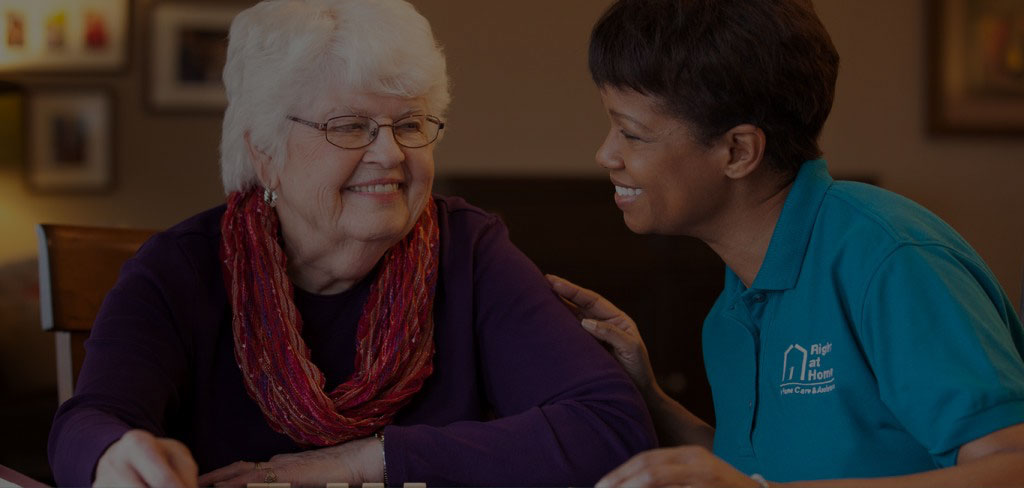Right at Home Says Families Are the Key to a Dementia-Friendly Future
With World Alzheimer's Day on September 21, the in-home health care brand highlights the benefits of intergenerational relationships and the importance of dementia education
OMAHA, Neb., Sept. 20, 2021 // PRNewswire // - In recognition of World Alzheimer's Day on Sept. 21, Right at Home, a global in-home health care brand, is emphasizing the important role that families, specifically children, play in the cognitive health of seniors.
With age being the top risk factor for Alzheimer's disease and other dementia, grandchildren may likely have grandparents who are living with memory loss. Dementia can profoundly change family relationships—including the connection between grandparents and grandchildren.
"While involved grandparents play a powerful, positive force in their grandchildren's lives both developmentally and emotionally, we often forget the role that grandchildren play in the lives of their proud grandparents," said Margaret Haynes, Right at Home COO. "More and more, we're seeing that intergenerational relationships are mutually beneficial and can have dramatic effects on health."
For families of seniors who have Alzheimer's disease or other dementia, it's important to be open and honest with grandchildren about the changes in their grandparent's behavior and memory.
"Adult children who are overwhelmed with caregiving tasks can sometimes lose sight of how their own children are affected by a grandparent's dementia," said Haynes. "Parents might be unsure of how to discuss the grandparent's condition, but silence is the worst policy—without information, children can be more frightened and emotionally distressed about their grandparent's change in personality."
The National Institute on Aging advises parents to be open with children, using statements like, "Grandma has an illness that makes it hard for her to remember things." Comforting children and letting them know it's normal to feel sad or angry can help them come to terms with the cognitive changes in their grandparent.
According to Right at Home, families can facilitate activities that grandparents with Alzheimer's and their grandchildren can do together, including arts and crafts, singing or listening to music, looking at photo albums, and even doing household chores.
If the grandparent with dementia lives at home with the children, parents should make the children's needs a priority, spending time with them, enabling them to continue to take part in activities, and minimizing the children having to provide supervision for the person with dementia. Professional in-home care services from Right at Home can help.
Right at Home's Dementia and Cognitive Support Program uses a person-centered approach to educate, empower, encourage and engage the entire family. The cornerstone of the program is that every person, no matter how advanced their disease, has the ability to be present and aware of their surroundings. Right at Home works with families to create a custom care plan that focuses on the person's history, routines and preferences, and then implements support activities around nutrition, socialization, awareness and wellness.
Families fulfill a critical role in Right at Home's approach. To support seniors living with dementia and cognitive change, Right at Home helps families learn techniques to connect, encourage participation in activities, and relate to their loved one in ways that empower their abilities.
"World Alzheimer's Day is a great time to honor the grandparents who provide so much unconditional love for the younger generation, passing down guidance and values, and helping busy parents," said Haynes. "It's also a great time to focus on dementia education."
SOURCE Right at Home
###
Media Contact:
Lauren Turner
Mainland
312.526.3996
[email protected]
| Right at Home Brand Profile Visit Right at Home Homepage |












 The franchise opportunities listed above are not related to or endorsed by Franchising.com or Franchise Update Media Group. We are not engaged in, supporting, or endorsing any specific franchise, business opportunity, company or individual. No statement in this site is to be construed as a recommendation. We encourage prospective franchise buyers to perform extensive due diligence when considering a franchise opportunity.
The franchise opportunities listed above are not related to or endorsed by Franchising.com or Franchise Update Media Group. We are not engaged in, supporting, or endorsing any specific franchise, business opportunity, company or individual. No statement in this site is to be construed as a recommendation. We encourage prospective franchise buyers to perform extensive due diligence when considering a franchise opportunity.